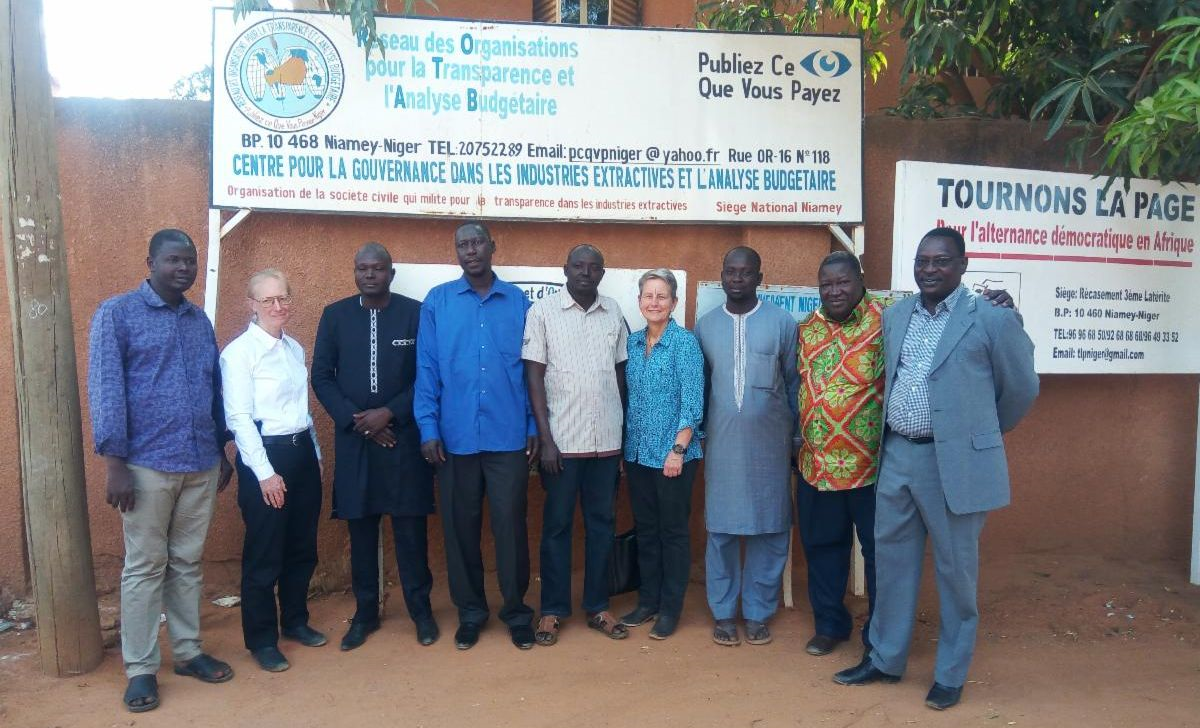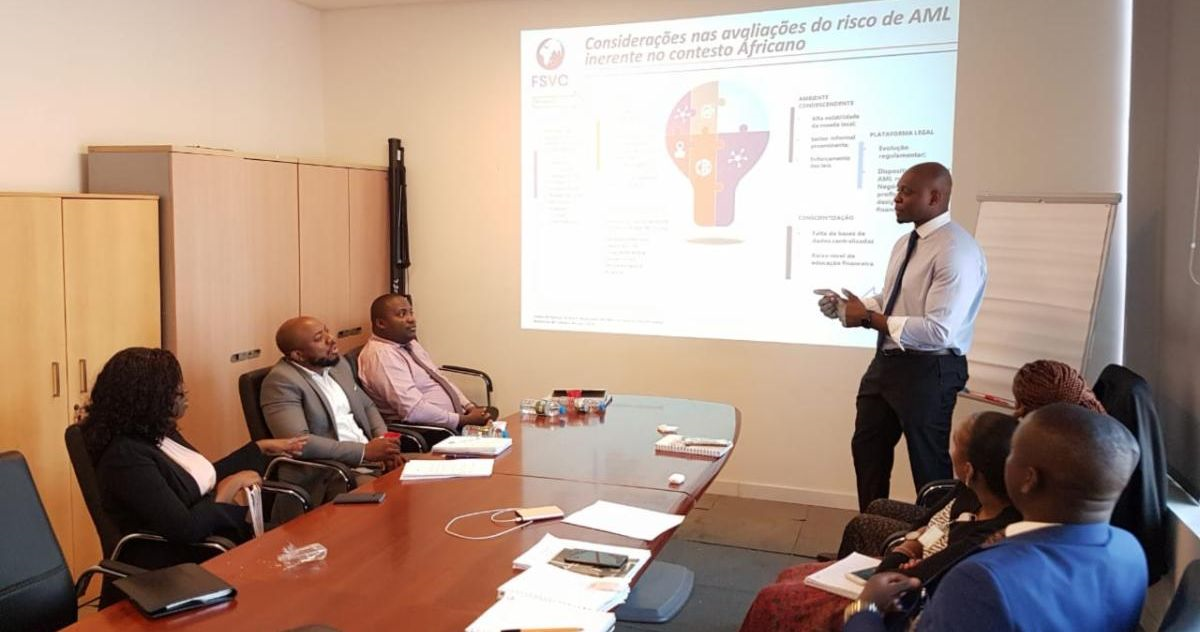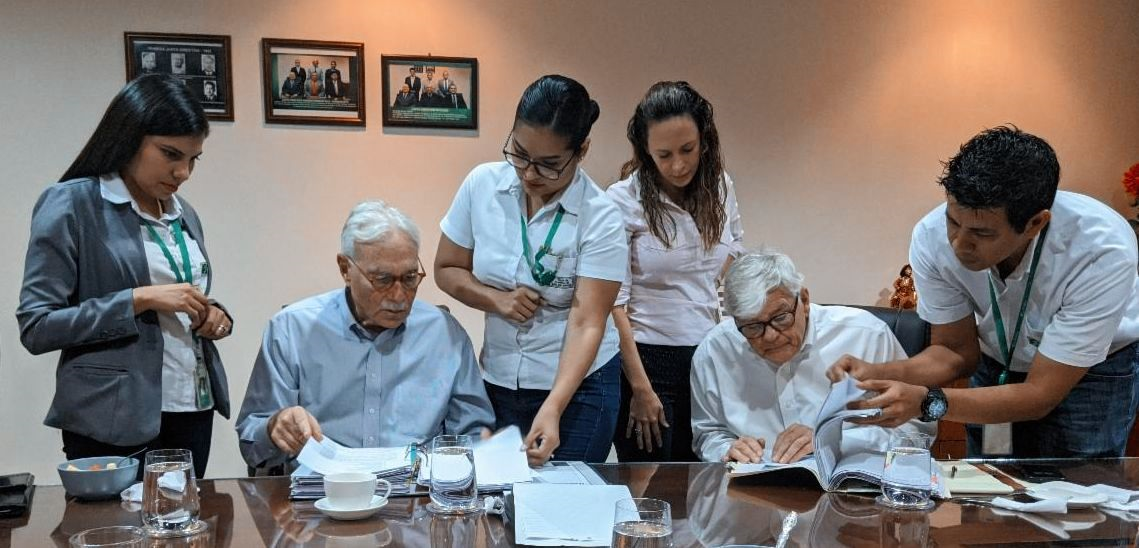Niger: Creating an Incubator for Civil Society Organizations

FSVC volunteer experts Faith Knutsen and Judith Millesen, FSVC Team Leader Saidou Arji, and representatives from the civil society organization ROTAB. Niamey, Niger, December 2019
In July 2019, FSVC started a U.S. Agency for International Development (USAID)-funded program in Niger focused on strengthening political accountability and policy-making, as well as fostering stronger civil society engagement. FSVC is working with select civil society organizations (CSOs) to build their capacity to advocate for reforms. To achieve this mission, FSVC is building a CSO incubator, modeled on the incubation paradigm widely used in the private sector for startups.
To start its first cycle of CSO incubation, FSVC published a call for applications, and in December 2019, two FSVC volunteer experts traveled to Niamey to evaluate the applications. The volunteer experts conducted individual interviews with the CSOs to assess their strengths and weaknesses. In particular, they analyzed information regarding the leadership, financial health, sustainability, skills and impact of each CSO.
FSVC now has a selected group of CSOs that will join the incubator in February. The CSO incubator will build the technical capacity of its members and strengthen civil society networks and coalitions, which will enhance constructive engagement among citizens, civil society and the government.
Tunisia: Building the Capacity of Chambers of Commerce

Moez Dalloua (FSVC Regional Director), Luciano Borin (FSVC Team Leader) and Ichraf Lajmi (FSVC Program Officer). Gafsa, Tunisia, December 2019
In October 2019, FSVC started a new program with three Tunisian Chambers of Commerce in Gabes, Gafsa and Beja, located in the interior and southern regions of Tunisia. Chambers of Commerce in Tunisia are public institutions that provide services to local businesses and small- and medium-sized enterprises (SMEs). However, the regions of Gabes, Gafsa and Beja suffer from higher poverty rates and are less economically developed than coastal Tunisia. Despite these challenges, there is significant potential for private-sector development in these regions, for example, in the areas of agriculture and natural resources.
To support entrepreneurship and economic growth in the interior of Tunisia, FSVC’s program provides technical assistance to these Chambers of Commerce to build their capacity to better serve local entrepreneurial communities. FSVC’s program is helping these Chambers of Commerce strengthen their human and financial management practices in a context of limited resources. It is also assisting the Chambers of Commerce in designing services that better respond to the needs of local SMEs and enhancing their communication efforts to ensure maximum outreach.
The program is funded by the U.S. Department of State’s Middle East Partnership Initiative (MEPI).
Angola: Strengthening AML/CFT Bank Examinations

FSVC volunteer expert Joao Bil Andrade and participants. Luanda, Angola, December 2019
In December 2019, FSVC conducted a training with the Banco Nacional de Angola (BNA) in international best practices in on-site supervision of banks in the area of anti-money laundering and combating the financing of terrorism (AML/CFT). This training marked FSVC’s inaugural project with the BNA, and the launch of FSVC’s third active program in Angola.
During the training, FSVC volunteer experts discussed the methodology of AML/CFT examinations, inspection cycles and notification processes, how to define an examination’s scope, documents to request during an examination and how to develop and write an examination report. The FSVC volunteer experts also accompanied 10 BNA examiners on an on-site inspection of a commercial bank. They then worked with the BNA examiners on drafting an inspection report with clear guidelines and deadlines for corrective actions.
As a result of this training, BNA examiners gained an in-depth understanding of the necessary actions and steps required to successfully inspect a bank. Stronger bank supervision is critical to strengthen confidence in the Angolan financial sector and expand ties with the international financial system.
El Salvador: Enhancing Credit Risk Management

FSVC volunteer experts John Webb and Harris Berger, and participants. San Salvador, El Salvador, December 2019
In December 2019, two FSVC volunteer experts conducted consultations with representatives from Fedecredito, a key financial institution in El Salvador, on best practices in loan portfolio and credit risk management.
Fedecredito is a regulated cooperative financial institution that operates across El Salvador and provides a range of services to SMEs and consumers. Fedecredito requested FSVC’s assistance to strengthen its problem loan workout capabilities and loss prevention techniques.
During the consultations, FSVC volunteer experts discussed best practices to manage problem loans, including their detection, assessment, negotiation and resolution. They explained how to restructure a loan to avoid default and exercise the collateral. The volunteer experts also highlighted the importance of data quality for portfolio analysis.
Thanks to FSVC’s assistance, Fedecredito is better equipped to manage its loan portfolio and credit risk. Fedecredito plays a key role in providing access to finance to SMEs, and must therefore manage risk effectively to maintain trust in the economy.